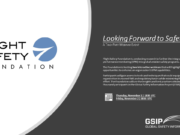
How do we collaborative proactively to produce the same safety improvements previously gained through accident investigations?
The aviation industry has learned a lot from its mistakes and has applied that learning over the decades. Accident investigative work has matured, as has the industry’s ability to capture data to inform those investigations so that they can produce robust mitigations, which have been applied in better technology, procedures and training.
In some areas of the world, and with some aircraft equipment types, we are witnessing a plateau in accident rate improvement curves. It is clear that we have entered an era in which we must look harder for performance improvements, and we must be sure that what we introduce will advance our performance. A growing industry and the travelling public are counting on continual safety improvement.
One of the most potentially significant and impactful developments that may help break through the plateau is the introduction of safety management systems (SMS). Using a performance-based approach to improving safety, combined with gathering relevant safety information in a “just culture” environment, has advanced the capability of many organizations around the world. Yet, operating a successful SMS and applying it within a state safety program (SSP) is still a huge challenge. Operating an effective SMS is not accomplished by following a simple recipe.
Flight Safety Foundation has long been engaged in trying to help accelerate the industry transition from reactively learning from past mistakes to proactively learning from current operations and predictively identifying emerging safety risks. Over the last three years, Flight Safety Foundation has addressed that challenge in its Global Safety Information Project (GSIP). Through GSIP, the Foundation is producing toolkits with variable levels of intensity in performing data collection, data analysis, information sharing and information protection. We believe making the transition to a proactive and predictive future will result, in part, from industry adoption and effective deployment of these toolkits. Further research to build upon the existing toolkits and how best to use them is essential.
Mark Millam is vice president, technical, at Flight Safety Foundation and leader of GSIP.

